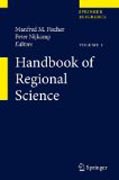
The Handbook of Regional Science is a multi-volume reference work providing astate-of-the-art knowledge on regional science composed by renowned scientists in the field. The Handbook is intended to serve the academic needs of graduate students, and junior and senior scientists in regional science and related fields, with an interest in studying local and regional socio-economic issues.The multi-volume handbook seeks to cover the field of regional science comprehensively, including areas such as location theory and analysis, regional housing and labor markets, regional economic growth, innovation and regional economic development, new and evolutionary economic geography, location and interaction, the environment and natural resources, spatial analysis and geo-computation as well as spatial statistics and econometrics. Manfred M. Fischer (born in 1947, Nuremberg, Germany) graduated in geography and mathematics from the Friedrich-Alexander University in Erlangen (Germany). He holds a Ph.D. (summa cum laude) on urban modelling from the same university (1975), and a habilitation degree in human geography from the University of Vienna (1982). Since 1988 he is professor in economic geography and GIScience at the Vienna University of Economics and Business. Manfred M. Fischer was co-founder of the prominent interdisciplinary journal Geographical Systems (Gordon & Breach) and is now editor-in-chief of its successor, the Journal ofGeographical Systems (Springer), and is a member of the editorial boards of several other peer-reviewed journals. He also co-founded the Springer book series, Advances in Spatial Science, and served for eight years as Chair of the IGU Commission on Mathematical Models. In this role he was responsible for organizing several of the Commission's highly successful international meetings around the world, including symposia in Shanghai and Beijing (1990).For more than thirty years he has consistently made significant contributionsto regional science and GIScience in general, and spatial analysis, GeoComputation and spatial econometrics in particular. He has published widely, both books and articles in more than 30 distinct academic journals. Recently, his monograph on Metropolitan Innovation Systems has been translated into Chinese (Shanghai People's Publishing House, 2006).On account of his scholarly achievements, he has been named a fellow of Regional Science Association International, a foreign fellow of the Royal Dutch Academy of Sciences, and a corr. member of the Austrian Academy of Sciences.Peter Nijkamp is Professor in Regional and Urban Economics and in Economic Geography at the VU University, Amsterdam. His main research interests cover quantitative plan evaluation, regional and urban modelling, multicriteria analysis, transport systems analysis, mathematical systems modelling, technological innovation, entrepreneurship, environmental and resource management, and sustainable development. In the past years he has focussed his research in particular on new quantitative methods for policy analysis, as well as on spatial-behavioural analysis of economic agents. He has a broad expertise in the area of public policy, services planning, infrastructure management and environmental protection. In all these fields he has published many books and numerous articles.He is member of editorial/advisory boards of more than 30 journals. He has been visiting professor in many universities all over the world. According to the RePec list he belongs to the top-30 of well-known economists world-wide. He is past president of the European Regional Science Association and of the Regional Science Association International. He is also fellow of the Royal Netherlands Academy of Sciences, and past vice-president of this organization. From 2002 – 2009 he has served as president of the governing board of the Netherlands Research Council (NWO). In addition, he is past president of the European Heads of Research Councils (EUROHORCs). He is also fellow of the Academia Europaea, and member of many international scientific organizations. He has acted regularly as advisor to (inter)national bodies and (local and national) governments. In 1996, he was awarded the most prestigious scientific prize in the Netherlands, the Spinoza award. INDICE: 1 Location Theory and Analysis.- 2 Regional Housing and Labour Markets.- 3 Regional Economic Growth.- 4 Innovation and Regional Economic Development.- 5 New Economic Geography and Evolutionary Economic Geography.- 6 Location and Interaction.- 7 Environmental and Natural Resources.- 8 Spatial Analysis and Geocomputation.- 9 Spatial Statistics.- 10 Spatial Econometrics.
- ISBN: 978-3-642-23429-3
- Editorial: Springer
- Encuadernacion: Cartoné
- Fecha Publicación: 01/05/2013
- Nº Volúmenes: 1
- Idioma: Inglés
